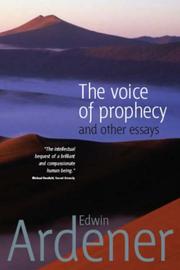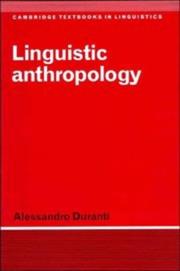| Listing 1 - 10 of 101 | << page >> |
Sort by
|
Periodical
ISSN: 15481395 10551360 Year: 1991 Publisher: [Berkeley, CA] : University of California Press
Abstract | Keywords | Export | Availability | Bookmark
 Loading...
Loading...Choose an application
- Reference Manager
- EndNote
- RefWorks (Direct export to RefWorks)
Anthropological linguistics --- Anthropological linguistics. --- Anthropo-linguistics --- Ethnolinguistics --- Language and ethnicity --- Linguistic anthropology --- Linguistics and anthropology --- Anthropology --- Language and culture --- Linguistics
Periodical
ISSN: 18268803
Abstract | Keywords | Export | Availability | Bookmark
 Loading...
Loading...Choose an application
- Reference Manager
- EndNote
- RefWorks (Direct export to RefWorks)
Ethnology --- Anthropology --- Linguistics --- Culture --- Anthropology. --- Culture. --- Ethnology. --- Linguistics. --- Social Sciences --- languages --- history --- ethno-anthropology --- multiculturalism --- linguistic anthropology
Book
ISBN: 1283121816 9786613121813 9027284776 9789027284778 9027220816 9789027220813 1556191170 9781556191176 9781283121811 6613121819 Year: 1991 Publisher: Amsterdam Philadelphia J. Benjamins Pub. Co.
Abstract | Keywords | Export | Availability | Bookmark
 Loading...
Loading...Choose an application
- Reference Manager
- EndNote
- RefWorks (Direct export to RefWorks)
An impressive collection of theoretical perspectives and empirical data which includes papers on Catalan, Galician, Tagalog, and the minority languages of Kenya. Most of the contributions deal with ethnic minorities in North America: language maintenance and shift and cultural aspects of various language minorities' as well as Judeo-English and Yiddish spoken by children of Jewish immigrants.
Anthropological linguistics. --- Anthropo-linguistics --- Ethnolinguistics --- Language and ethnicity --- Linguistic anthropology --- Linguistics and anthropology --- Anthropology --- Language and culture --- Linguistics

ISBN: 9781785335570 178533557X 978184545331X 184545331X 9781845453312 1785337696 9781785337697 Year: 2017 Publisher: New York Oxford
Abstract | Keywords | Export | Availability | Bookmark
 Loading...
Loading...Choose an application
- Reference Manager
- EndNote
- RefWorks (Direct export to RefWorks)
Edwin Ardener - a new expanded edition of the collected works of one of the most important social anthroplogists in Britain of his time. Ardener worked on social, economic, demographic and political problems, and was particularly influential in his sustained effort to bring together social anthropology and linguistics in a highly original attempt to reconcile scientific and humanistic approaches to the study of society. This volume offers a theoretically and conceptually coherent body of work by this innovative and profound thinker, which will continue to excite and stimulate new generations of students and researchers as it has in the past.
Anthropological linguistics. --- Anthropo-linguistics --- Ethnolinguistics --- Language and ethnicity --- Linguistic anthropology --- Linguistics and anthropology --- Anthropology --- Language and culture --- Linguistics
Book

ISBN: 9783110726626 3110726629 Year: 2022 Publisher: Berlin Boston
Abstract | Keywords | Export | Availability | Bookmark
 Loading...
Loading...Choose an application
- Reference Manager
- EndNote
- RefWorks (Direct export to RefWorks)
This book provides an overview of approaches to language and culture, and it outlines the broad interdisciplinary field of anthropological linguistics and linguistic anthropology. It identifies current and future directions of research, including language socialization, language reclamation, speech styles and genres, language ideology, verbal taboo, social indexicality, emotion, time, and many more. Furthermore, it offers areal perspectives on the study of language in cultural contexts (namely Africa, the Americas, Australia and Oceania, Mainland Southeast Asia, and Europe), and it lays the foundation for future developments within the field. In this way, the book bridges the disciplines of cultural anthropology and linguistics and paves the way for the new book series Anthropological Linguistics.
Anthropological linguistics. --- Anthropo-linguistics --- Ethnolinguistics --- Language and ethnicity --- Linguistic anthropology --- Linguistics and anthropology --- Anthropology --- Language and culture --- Linguistics
Book
ISBN: 9811524335 9811524327 9789811524325 9789811524332 Year: 2020 Publisher: Singapore Springer
Abstract | Keywords | Export | Availability | Bookmark
 Loading...
Loading...Choose an application
- Reference Manager
- EndNote
- RefWorks (Direct export to RefWorks)
This book offers fresh critical insights to the field of children’s literature translation studies by applying the concept of transcreation, established in the creative industries of the globalized world, to bring to the fore the transformative, transgressional and creative aspects of rewriting for children and young audiences. This socially situated and culturally dependent practice involves ongoing complex negotiations between creativity and normativity, balancing text-related problems and genre conventions with readers’ expectations, constraints imposed by established, canonical translations and publishers’ demands. Focussing on the translator’s strategies and decision-making process, the book investigates phenomena where transcreation is especially at play in children’s literature, such as dual address, ambiguity, nonsense, humour, play on words and other creative language use; these also involve genre-specific requirements, for example, rhyme and rhythm in poetry. The book draws on a wide range of mostly Anglophone texts for children and their translations into languages of limited diffusion to demonstrate the numerous ways in which information, meaning and emotions are transferred to new linguistic and cultural contexts. While focussing mostly on interlingual transfer, the volume analyses a variety of translation types from established, canonical renditions by celebrity translators to non-professional translations and intralingual rewritings. It also examines iconotextual dynamics of text and image. The book employs a number of innovative methodologies, from cognitive linguistics and ethnolinguistics to semiotics and autoethnographic approaches, going beyond text analysis to include empirical research on children’s reactions to translation strategies. Highlighting the complex dynamics at work in the process of transcreating for children, this volume is essential reading for students and researchers in translation studies, children’s fiction and adaptation studies.
Children's literature --- Technique. --- Social aspects. --- Juvenile literature --- Literature --- Authorship --- Literature—Translations. --- Cognitive grammar. --- Linguistic anthropology. --- Semiotics. --- Translation Studies. --- Cognitive Linguistics. --- Linguistic Anthropology. --- Semeiotics --- Semiology (Linguistics) --- Semantics --- Signs and symbols --- Structuralism (Literary analysis) --- Anthropo-linguistics --- Ethnolinguistics --- Language and ethnicity --- Linguistic anthropology --- Linguistics and anthropology --- Anthropology --- Language and culture --- Linguistics --- Cognitive linguistics --- Grammar, Comparative and general --- Psycholinguistics --- Children's literature - Translations --- Translating and interpreting --- Children's literature. Juvenile literature --- Theory of literary translation
Multi
ISBN: 9781107030077 9781139342872 1107030072 1139342878 1139985396 1139990004 Year: 2014 Publisher: Cambridge Cambridge University Press
Abstract | Keywords | Export | Availability | Bookmark
 Loading...
Loading...Choose an application
- Reference Manager
- EndNote
- RefWorks (Direct export to RefWorks)
"The field of linguistic anthropology looks at human uniqueness and diversity through the lens of language, our species' special combination of art and instinct. Human language both shapes, and is shaped by, our minds, societies, and cultural worlds"--
Linguistics --- Ethnology. Cultural anthropology --- Anthropological linguistics. --- Ethnolinguistique --- Anthropological linguistics --- Anthropo-linguistics --- Ethnolinguistics --- Language and ethnicity --- Linguistic anthropology --- Linguistics and anthropology --- Anthropology --- Language and culture
Book
ISBN: 9783110224498 9783110224504 9783110393712 311022450X 3110393719 9783111740454 3111740455 3110224496 Year: 2016 Volume: 43 43 Publisher: Berlin De Gruyter Mouton
Abstract | Keywords | Export | Availability | Bookmark
 Loading...
Loading...Choose an application
- Reference Manager
- EndNote
- RefWorks (Direct export to RefWorks)
Das Ziel des Handbuchs ist es, die 'kulturwissenschaftliche Lücke' in der Sprachwissenschaft historisch und systematisch zu reflektieren sowie einen Beitrag zu ihrer Schließung zu leisten. Die Klärung der Frage: "Wie ist Sprachwissenschaft als Kulturwissenschaft möglich?" soll sowohl aus der disziplinären Innenperspektive vorliegender Ansätze der Sprachwissenschaft, als auch aus der Außenperspektive benachbarter Disziplinen fokussiert werden. This handbook undertakes a systematic historical reflection on “cultural science gaps” in linguistics, and seeks to contribute to their resolution. How can linguistics be a cultural science? Answering this question requires the use of methodological resources in linguistics as well as outside perspectives drawn from related disciplines.
Linguistics --- Ethnology. Cultural anthropology --- Anthropological linguistics. --- Language and culture. --- Culture and language --- Culture --- Anthropo-linguistics --- Ethnolinguistics --- Language and ethnicity --- Linguistic anthropology --- Linguistics and anthropology --- Anthropology --- Language and culture

ISBN: 1107112095 1283329468 9786613329462 113913390X 0511810199 113912997X 1139145576 0511065450 0511059124 0511067585 9780511067587 9780521449939 0521449936 9780511065453 9780511810190 9781139145572 0521445361 0521449936 9780521445368 9781139590136 1139590138 Year: 1997 Publisher: New York
Abstract | Keywords | Export | Availability | Bookmark
 Loading...
Loading...Choose an application
- Reference Manager
- EndNote
- RefWorks (Direct export to RefWorks)
In this textbook, first published in 1997, Alessandro Duranti introduces linguistic anthropology as an interdisciplinary field which studies language as a cultural resource and speaking as a cultural practice. The theories and methods of linguistic anthropology are introduced through a discussion of linguistic diversity, grammar in use, the role of speaking in social interaction, the organisation and meaning of conversational structures, and the notion of participation as a unit of analysis. An entire chapter is devoted to the notion of culture, and there are invaluable methodological chapters on ethnography and transcription. Original in its treatment and yet eminently clear and readable, Linguistic Anthropology will appeal to both upper-level undergraduate and graduate students.
Anthropological linguistics. --- Anthropo-linguistics --- Ethnolinguistics --- Language and ethnicity --- Linguistic anthropology --- Linguistics and anthropology --- Anthropology --- Language and culture --- Linguistics --- Anthropological linguistics --- Ethnolinguistique --- Sociolinguistics --- Arts and Humanities --- Language & Linguistics
Book
ISBN: 0803246390 1299535321 9781299535329 9780803246393 0803243952 9780803243958 Year: 2013 Publisher: Lincoln
Abstract | Keywords | Export | Availability | Bookmark
 Loading...
Loading...Choose an application
- Reference Manager
- EndNote
- RefWorks (Direct export to RefWorks)
In American Anthropology and Company, linguist and sociologist Stephen O. Murray explores the connections between anthropology, linguistics, sociology, psychology, and history, in broad-ranging essays on the history of anthropology and allied disciplines. On subjects ranging from Native American linguistics to the pitfalls of American, Latin American, and East Asian fieldwork, among other topics, American Anthropology and Company presents the views of a historian of anthropology interested in the theoretical and institutional connections between disciplines that have always be
Sociology --- Anthropological linguistics --- Anthropology --- Anthropo-linguistics --- Ethnolinguistics --- Language and ethnicity --- Linguistic anthropology --- Linguistics and anthropology --- Language and culture --- Linguistics --- Human beings --- History. --- Primitive societies --- Social sciences
| Listing 1 - 10 of 101 | << page >> |
Sort by
|

 Search
Search Feedback
Feedback About UniCat
About UniCat  Help
Help News
News